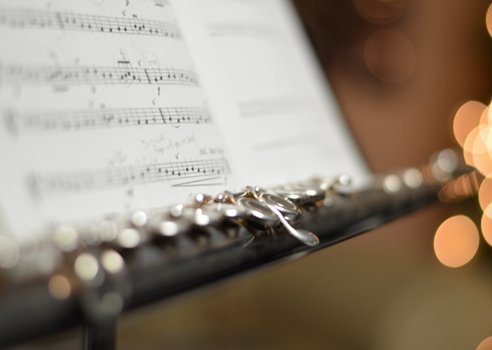Reading time: About 3 minutes
After a gap of many years, I’m suddenly back taking flute lesssons. And who knew they would come with a valuable writing lesson? Read on to learn more.
I come from a musical family. My grandmother earned a double degree in piano and violin from Mount Alison in Sackville, New Brunswick, just after the turn of the last century. My aunt attended Julliard to study to become a concert violinist. And my son is also intensely musical. He’s been composing since he was nine.
I have a pretty good ear — but little training. As a child, I desperately wanted piano lessons, but my parents could afford neither the piano nor the teacher. When I moved away from home in my late teens I was so starved for music I decided to choose an instrument that would fit in my tiny apartment. I picked the flute.
I unearthed a great teacher and took lessons for about 10 years. Apart from the time I accidentally serenaded the entire neighborhood with scales — I’d mistakenly left my front-door intercom off the hook — I did reasonably well, too.
Later, after acquiring a husband, a house, a piano and giving birth to three kids, I finally took piano lessons. Trust me. Triplet children and piano lessons are a musical combo from hell. I was dog-tired all the time and could never fit in the practicing. I quit.
Now that my kids are older and our recent house reno project is finally complete, you’d think I’d take up piano again. But, it turns out my basic, if rusty, flute competence was a stronger lure. My former teacher had left town, but when I saw a sign for a new teacher magically appear on the bulletin board of my grocery store, I signed up so fast it would make a piece played prestissimo seem like a slow waltz.
It’s been a bit depressing to start again at almost the beginning, but I know I’ll make rapid progress given my commitment to practicing. (I’m doing 30 minutes every day. No shortcuts!) And the best news is my new teacher is entirely different from my last one.
I’m certainly not knocking my last teacher when I say this — she was fabulous. But this new experience has impressed me with what you can learn from different people. For example, my former teacher seldom focused on my embouchure (how you hold your mouth); my new teacher is obsessed with it. This doesn’t make either of them right. It’s just different. And for the student, that difference is profoundly helpful.
The other “wow” moment I’ve had with my new teacher — and here’s the writing connection you’ve been waiting for — is his focus on how I speak to myself. Most people I know — well, apart from my immediate family, who get to see me in all my unvarnished zealotry — probably perceive me to be quiet and easy-to-get-along-with. But I’m a very tough task-master. And, like many people, I’m hardest on myself.
My teacher has caught me saying things like “this isn’t very good, but…” and “I hate flats and sharps…” and “I’m sorry my tone is so thin right now…” And, good for him, he’s stopped me. “Don’t talk about yourself that way,” he’s said. (And he hasn’t even heard some of the doozies I’d never utter out loud.)
“Think of the inner slide show you have playing in your brain,” he comments (and yes, and he gets extra marks for being good with metaphor!) “If you frequently tell yourself ‘I’m no good at this,’ that’s what your brain will keep going back to and you’ll make more mistakes. Why would you want to do that?”
So what do you say to yourself about your flute playing? No, ha ha, what do you say to yourself about your writing? Do you utter sentences like: “I’m pretty boring.” Or “Gee, I’m a crummy writer.” Or, “I can’t ever think of what to write?”
By saying those things, you’re increasing the likelihood of making them true. So, stop saying them! I’m not suggesting this will solve all your writing problems, just as positive talk alone won’t make me a better flute player.
But, if you practice, and you spend your time on careful editing (while you tune out the whiney, self-critical, negative voice) then you’ll become a better writer.
This isn’t easy — just sayin’ I know that — but it’s an easier path to becoming a better writer. And better flute player.


